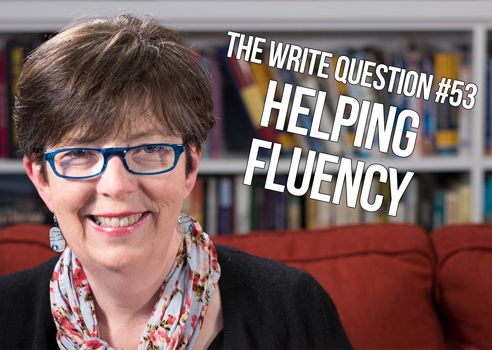Viewing time: 4 min. 15 sec.
The Write Question is a weekly video podcast about writing that I started in 2017 and that ran, more or less weekly, until April 2022. This is a republication of issue #53, with tips for improving English fluency. The post first ran on April 20/18.
Transcript:
Welcome to The Write Question, I’m Daphne Gray-Grant. Today I’m giving advice on improving English fluency.
Here’s a question from Subho Chakraborty, a medical doctor and consultant in Kolkata, India. Here’s what he asked via video:
“Being a non-native speaker of English, I often find it very difficult to handle verb tenses. And the second problem is I tend to write very wordy sentences. When somebody points out the word length, I do tend to cut down on the sentences but then the style becomes choppy. How can I overcome these problems?”
Thanks for the question, Subho. First, let me congratulate you on your English. It’s always hard learning another language and I’m frequently amazed by the people who don’t give themselves nearly enough credit for the work they’ve done. Judging by the English in your video, you’re doing really well.
Now, if you want to become even better at English, I have a couple of suggestions for you.
Tenses are hard to master in my native language. English has 16 verb tense and aspect combinations. Tense indicates time. Aspect indicates repetition, duration and completion. It’s confusing I know, so I’ve included a link below to a slideshow that will walk you through the differences. Ten of these 16 tenses are used frequently by native speakers but you will be unlikely to encounter them frequently enough to learn them unless you are in an immersion situation.
So, if you want to become an expert, I suggest you try to figure out a way to increase your exposure to English. If you have any native English-speaking friends, try to meet with them regularly for conversation and ask them to correct your errors. If you have English TV, watch shows and let your brain absorb the correct use of the language. And don’t forget to read books and magazines in English.
Be aware that it’s difficult to become fluent in another language, so this effort will take time. Be patient with and supportive of yourself.
In terms of your problem with wordiness, never try to write only sentences that are short. THIS is what will lead to a choppy rhythm. Many people, especially academics, are often accused of writing too many over-ly long sentences. But not all long sentences are bad. In fact, some of the most elegant sounding English always occurs when you have rather long sentences followed by some exceedingly short ones. Like that one!
What I just gave you was a 23-word sentence followed by a three-word one. Trying to edit all of your sentences to the same length is not only infuriating, it’s not ‘good english’. Instead, try to make sure that each long sentence is followed by a short one and your rhythm will be restored. I’ve written a blog post on this topic and I’ve included the link below.
Improving English is a worthwhile goal but don’t let your desire to be excellent get in the way of being very good at it. Give yourself time and allow yourself the luxury of making a few mistakes. We all learn from our mistakes.
Finally, let me wrap up with a quote from English writer George Bernard Shaw: “Success does not consist in never making mistakes but in never making the same one a second time.”
Thanks for your question, Subho (pronounced Shabu). You already know a lot about English. Give yourself plenty of time to get to the next level.


